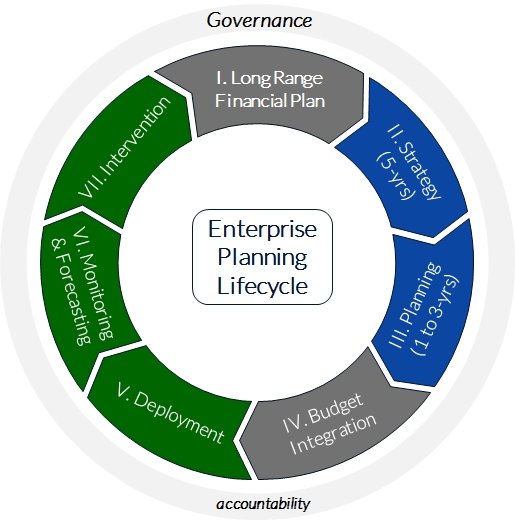An Integrated Approach for Maximizing Strategy Realization: The Enterprise Planning Lifecycle - Part 1 of 4
Part 1: The Case for Establishing a Formal Enterprise Planning Lifecycle (EPL)
This is the first in Forum Solutions’ four-part series: Maximizing Strategy Realization: The Enterprise Planning Lifecycle.
Strategic planning is a key function of all enterprises. Whether running a Fortune 50 company or a non-profit organization, it is critical to prioritize resources and activities to maximize organizational objectives. Strategic planning is also important for aligning employees around a common vision. Despite being such a critical function, many organizations struggle to realize their strategic objectives. A survey of executives by The Economist and the Project Management Institute (PMI) showed that[1]:

Only 56% of strategic initiatives had been successful over a 3-year retrospective
Half (52%) of the completed strategic initiatives showed poor or fair results
A separate meta-study by researchers Candido and Santos suggested an estimated strategy execution rate of somewhere between 30%-70%.[2] Not surprisingly, 61% of The Economist respondents reported struggling with bridging the gap between strategy and operations. When asked for the main reason these efforts failed, the most common response from executives was a lack of leadership endorsement and support, especially at the C-suite level. Respondents did not feel like the C-suite should be overseeing individual efforts; rather, they should provide oversight and accountability to the process to drive results.
The inability to execute the strategic plan has a significant impact on a company’s bottom line. A study from Profit from the Core showed that 7 out of 8 companies surveyed were unable to deliver 5.5% annual growth, while 90% of those companies had detailed strategic plans to exceed those goals.[3] No surprise that missing strategic milestones today can create serious anxiety for the C-suite. Similarly, finance executives are tasked with being responsible for enterprise performance while having little direct operational oversight. Boards are involved and are increasingly expected to hold CEOs accountable for poor execution. So, considering a poor track record for strategy realization, what can be done?
While it is not as simple as connecting these siloed perspectives together, enterprise planning and execution can be framed more effectively as a continuous multidisciplinary process rather than disparate unique activities performed by different departments. Additionally, as boards increase accountability at the C-suite level, “set it and forget it” is no longer an approach executives can take to drive results. There needs to be a process with strong executive engagement all year round. To ensure effective strategy execution and to capture the resulting financial performance, we propose that an integrated, multidisciplinary, and formal Enterprise Planning Lifecycle (EPL) be deployed:
In this 4-part series, we will outline the EPL framework, how to approach developing and deploying a robust EPL for your organization to maximize strategy development and realization.
The Enterprise Planning Lifecycle (EPL) Part 1 of 4: The case for the EPL
The Enterprise Planning Lifecycle (EPL) Part 2 of 4: The EPL Framework
The Enterprise Planning Lifecycle (EPL) Part 3 of 4: Optimizing the EPL
The Enterprise Planning Lifecycle (EPL) Part 4 of 4: EPL Deployment & Final Thoughts
Forum Solutions is a management consulting company dedicated to crafting and delivering transformational outcomes for our clients, our colleagues, and our community. With our help, clients become more agile, resilient, and connected, bringing great ideas to fruition with brilliant results. From start-ups to the Fortune 50, business leaders rely on Forum Solutions to help them form and realize their strategies. Our company is a certified Woman Owned Business that believes in developing and growing our colleagues, company, and region in a socially conscious way.
[1] https://www.pmi.org/learning/thought-leadership/series/pmo/c-suite-failing-strategiy-lessons
[2] Cândido, C., & Santos, S. (2015). Strategy implementation: What is the failure rate? Journal of Management & Organization,21(2), 237-262. doi:10.1017/jmo.2014.77
[3] https://hbr.org/2005/10/the-office-of-strategy-management


